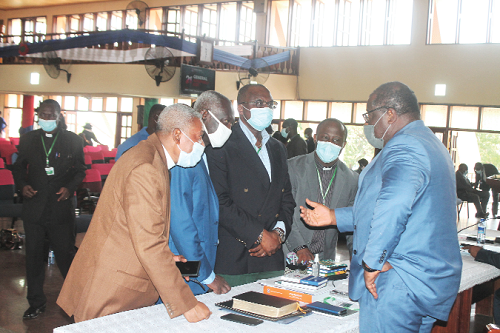The debate over the Free SHS policy has been revived with the Presbyterian Church of Ghana (PCG) advising the government to explore other means of financing the policy to make it sustainable.
The Moderator of the PCG, Rt Rev. Prof. Joseph Obiri Yeboah Mante, said the government should not be the sole financier, but should be open and allow others to contribute financially to make the policy viable, sustainable and have the desired impact.
“If the whole project is not sustainable, there is no harm in asking others to contribute to a fund to support this good system,” he said.
General Assembly
The Moderator was speaking at the 21st General Assembly of the PCG held in Accra yesterday.
The General Assembly of the PCG is an annual event where policies and decisions affecting the church are made.
It is also the body that elects national officers of the church such as the Moderator and Clerk of the PCG.
It is constituted by representatives from all the 22 presbyteries that make up the PCG.
This year’s event was on the theme: “Jesus Christ, the Light of the World.
Challenges
Rt Rev. Prof. Mante lauded the government for introducing the Free SHS policy, describing it as a life-changing policy and a courageous decision.
“With the Free SHS, many more people now have access to high school education which hitherto could not have for financial reasons,” he said.
He, however, noted that the implementation of the policy had been fraught with certain challenges which required the government to take a different approach, particularly with regard to financing the policy.
“In several cases, students never complete the syllabus, and in other places the schools are so oversubscribed that some students are sleeping on the floor,” he said.
Financing the policy
The Free SHS was the flagship social intervention policy introduced by President Nana Addo Dankwa Akufo-Addo in 2017, to provide access to senior high school education to millions of children, who had no means of affording the education .
The policy allows students to enjoy free education, with the government paying for tuition, meals for both boarders and day students, textbooks, library fee, boarding, science laboratory, examination, utility fees, among other fees.
On July 22, this year, the Minister of Finance, Mr Ken Ofori-Atta, told Parliament that the government had spent about GH¢7.62 billion on the Free SHS since its introduction in 2017.
According to him, the policy had increased student enrolment in SHSs from 881,600 in 2016 to 1,261,125 in 2021.
Debate
Since its introduction, there had been different debates about its sustainability, with many groups calling on the government to explore other means of financing the policy.
The introduction of the double-track system which made students to attend school in a shift system, led some groups, including the opposition National Democratic Congress (NDC), to question the viability and sustainability of the policy.
The Minister of Education, Dr Yaw Osei Adutwum, however, insisted that the policy was not under stress for some people to be made to pay the school fees of their wards.
He described the policy as solid, and said there was no cause for alarm and no need for people to help sustain it.
“I do not see why people are making the argument that we are under stress. I do not see why those who pay taxes should now be made to pay fees,” he told journalists in May, this year.
Policy must not fail
Rt Rev. Prof. Mante said inasmuch as the government was committed to sustaining the policy, there was nothing wrong in seeking support from the public.
“We as citizens must contribute to help the successful implementation of this policy. It is a good thing and we must help sustain it,” he said.
Fix the country
The Moderator of the PCG also touched on the “Fix the Country” movement and said although there was nothing wrong for people to ask the government to fix the country, fixing the country was everyone’s responsibility.
“Fixing the country is not and cannot be a one-way affair. We must all fix ourselves for the country to be fixed,” he said.
PCG’s impact
On issues pertaining to the PCG, he said despite the scourge of the COVID-19 pandemic, the PCG made tremendous achievements in not just the spiritual lives of its members, but also in the area of education, health care and social intervention in the country.
“I am happy to state that PCG is growing stronger. For this we are grateful to the Lord,” he added.Writer’s email: emma.hawkson@graphic.com.gh

